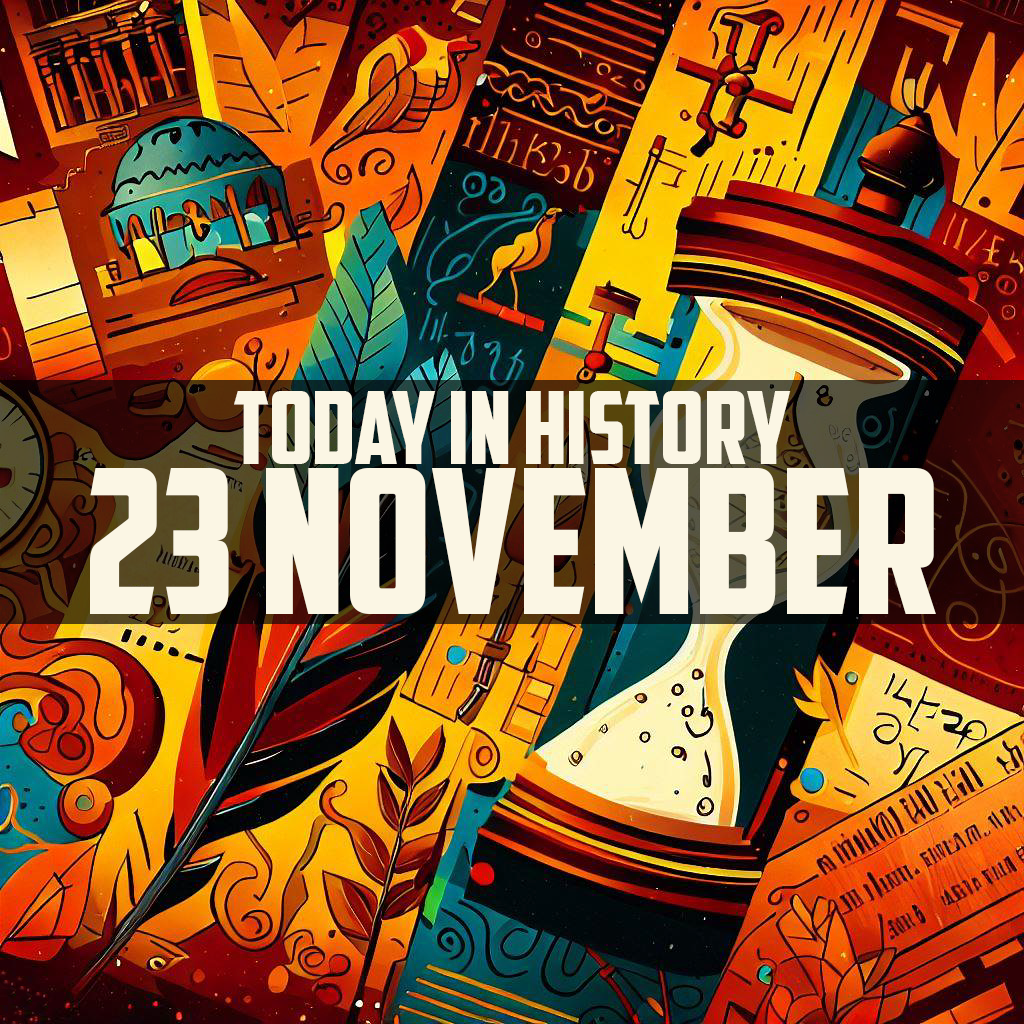Every day of the calendar year holds its own historical significance, offering glimpses into our collective past. The 23rd of November, in particular, has witnessed events that have left an indelible mark on the world. From scientific advancements to political shifts and cultural milestones, let’s dive into some of the most remarkable events that transpired on this day.
Today in History: 23 November

1. 1963: “Doctor Who” Debuts on BBC Television
While we briefly touched upon the inception of “Doctor Who” in the context of 22 November, it’s worth noting that this iconic show, featuring the adventures of the Doctor, a Time Lord from the planet Gallifrey, made its debut on 23 November 1963. Since then, the show has enjoyed enormous success, becoming the longest-running sci-fi TV series in history. Its cultural impact is evident through its longevity and dedicated fan base, known affectionately as “Whovians.”
2. 1889: The First Jukebox
On this day, the first jukebox was installed at the Palais Royale Saloon in San Francisco. This marked a transformative moment in the music industry, offering patrons the opportunity to select their preferred tunes. Over the decades, jukeboxes have become symbolic of certain eras, particularly the 1950s and 1960s, representing leisure, youth culture, and the joy of music.
3. 1992: Miley Cyrus is Born
Miley Cyrus, an American singer, songwriter, and actress, was born on this day. She initially rose to fame for her role as Miley Stewart/Hannah Montana on the Disney Channel series “Hannah Montana”. Over the years, Cyrus has proven herself as a versatile artist, transitioning from her Disney image to a global pop sensation. Her music and public image have consistently evolved, making her a figure of both controversy and admiration.
4. 1971: China Joins the United Nations
A significant political development, the People’s Republic of China took up the Chinese seat at the United Nations on this day, replacing Taiwan (Republic of China). This marked an acknowledgment of China’s growing political and economic clout on the global stage.
5. 1890: The Grand Duchy of Luxembourg is Separated from the Netherlands
A European political event of note, the Grand Duchy of Luxembourg was formally separated from the Kingdom of the Netherlands on this day. This occurred after the death of William III, ending the personal union between the two countries.
6. 1914: The Battle of Basra During World War I
One of the many battles of World War I, the Battle of Basra began on 23 November 1914 between British and Ottoman troops. The port city of Basra, located in modern-day Iraq, was of strategic importance. Its capture by the British marked the beginning of a series of battles in the Mesopotamian campaign.
7. 1936: Life Magazine is Reborn
Henry Luce, the co-founder of Time, bought Life magazine to obtain the rights to its name. On 23 November 1936, he relaunched it as a photo-centric publication. This iteration of Life went on to become one of the most iconic publications, known for its extensive photojournalism and capturing pivotal moments in world history.
8. 2001: The Convention on Cybercrime is Signed
In a move to address the challenges of the digital age, the Convention on Cybercrime was signed in Budapest. This treaty, aimed at Internet and computer crime, sought to harmonize national laws, improve investigative techniques, and foster international cooperation among nations.
9. 1867: Manchester Martyrs are Executed
On this day, three Irishmen were executed in Manchester, England, after being convicted of the murder of a police officer. The event, linked to Irish nationalist activism, saw these individuals posthumously referred to as the “Manchester Martyrs.” Their execution brought attention to the Irish nationalist cause.
10. 1979: Thomas McMahon is Sentenced
Thomas McMahon, an Irish Republican Army (IRA) member, was sentenced for the assassination of Louis Mountbatten, a British admiral and statesman, and three others. This act was one of the many violent episodes during the period known as “The Troubles” in Northern Ireland.
11. 1946: French Navy Scuttles its Fleet at Toulon
To prevent the fleet from falling into German hands during World War II, the French Navy scuttled 77 ships at the port of Toulon. This was a drastic action, reflecting the desperate circumstances and the challenges France faced during the war.

Conclusion:
The historical events of 23 November showcase a tapestry of human endeavours, from the world of entertainment to the vast arena of geopolitics. Understanding these events gives us a better appreciation of the progress we’ve made, the challenges we’ve faced, and the stories that bind us together as a global community. As we look back at this day, we are reminded that every day holds significance, and every event, big or small, plays a part in shaping our collective journey.
